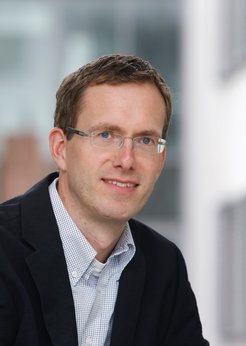New Director at the Max Planck Institute for Terrestrial Microbiology
Helge Bode complements the science community at Marburg`s Campus Lahnberge with his research on microbial natural products

The research landscape of Hesse is familiar terrain for Helge Bode: since 2008, he has been professor at the University of Frankfurt, studying the function and biosynthesis of microbial natural products, i.a. within the framework of ERC Research Grants.
The application of natural products as clinical drugs has shaped the fate of humankind decisively. In the face of antibiotic resistance, microbial natural products come back into focus of the pharmaceutical industry. However, our knowledge of the function, synthesis and ecological significance of these microbial products stands in stark contrast to their dazzling diversity, emphasizes Helge Bode: "In bacteria, communication takes place mainly via chemicals. Accordingly, bacteria are like miniature factories, producing an enormous variety of natural product classes. Nowadays, we finally have the methods to recognize and characterize this wealth of microbial chemistry. And to answer the questions: how, why and when is it formed? How is their production regulated, and what is their function in natural habitats?”
While his group is working on the fundamental understanding of all these processes, the detailed elucidation of the biosynthesis pathways additionally provides the opportunity to produce novel natural products, thus closing a circle: using modified metabolites to answer fundamental questions of basic research.
To achieve his goals, the new Max Planck director uses a fascinating model system that combines three groups of organisms: Bacteria of the genera Photorhabdus and Xenorhabdus live as gut symbionts in the intestine of soil-dwelling nematodes of the genera Heterorhabditis and Steinernema. The nematodes infect insect larvae into which they inject the bacteria, which kill the insect larvae and thus provide a food source for both bacteria and nematodes.
Despite its ecological complexity, this tripartite model system can be studied in the laboratory in different partial combinations and at all stages of the life cycle and, most importantly, be genetically manipulated. The bacteria play a central role in this system. "Because the bacteria never know which environment their host nematode will deliver them to, thus changing their habitat unexpectedly, they must have a particularly large chemical arsenal on hand," explains Helge Bode. He is particularly interested in the bacteria's so-called non-ribosomal peptide synthetases (NRPS), which can process amino acids as well as other building blocks into complex natural products using a kind of modular principle. "NRPS are among the most widespread biosynthesis enzymes for natural products, but their role and function are not well known in detail. Fortunately, we can manipulate this class of enzymes very efficiently, so that non-natural natural products are also produced.”
The new Max Planck Director applies a broad spectrum of methods ranging from HPLC-coupled mass spectrometry and genome analysis to synthetic microbiology. The Max Planck Institute in Marburg offers the best possibilities in this field. "Synthetic microbiology in particular is a major focus in Marburg and we are pleased to contribute here, among other things, with the manipulation of NRPS in order to better understand the ecological significance of microbial natural products.” Especially since Marburg, with the former group of Prof. Dr. Mohamed Marahiel, represents one of the birthplaces of NRPS research, as Bode emphasizes.
"We are very pleased that Prof. Helge Bode has accepted the appointment. The new department supplements our institute`s already existing know-how in bacterial cell biology, system biology and synthetic biology in ideal ways," says Professor Dr. Victor Sourjik, managing director of the MPI for Terrestrial Microbiology.
After studying chemistry and biology and a doctorate in chemistry at the University of Göttingen, Helge Bode worked in Göttingen, Braunschweig and at the Stanford University, USA. In 2004, he accepted a junior professorship at Saarland University before moving to Frankfurt University in 2008, where he conducted research within the framework of ERC Starting and Advanced Grants. His work in Frankfurt will continue until the end of 2020. Until then he will establish his department at the Max Planck Institute for Terrestrial Microbiology on a part-time basis.












